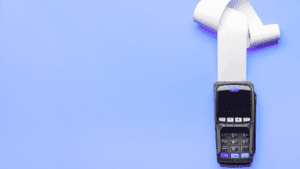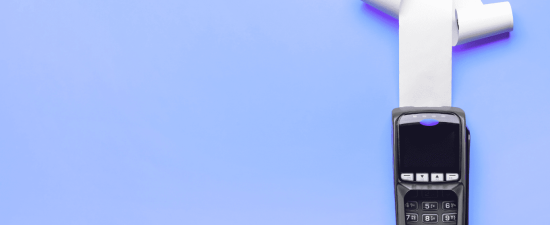Quality cashier training is an essential step in your business running smoothly.These cashier training tips will help you equip your staffto handle the day-to-day interactions with your paying customers.
It goes without saying that cashiers play a vital role in your business. A well trained cashier can make or break the customer experience. As a business owner, you want to pursue excellence as a business and reflect that in every interaction. This attitude tells the employee & customer alike, “We are glad you’re here and we are ready for you!”

It might seem like a given, but hear me out. A business that has a culture which values their employees inherently values their customers. It’s no secret that an employee who feels important and empowered will make your customers feel valued as well. After all, healthy trees are deeply rooted and grow from within. Healthy employees start with good business practices and managerial skills. So ask yourself, how do you value your employees? Start from the very beginning with great training – here are some tips to help you and your new employee.
Table of Contents
ToggleWhat exactly do cashiers do? What is the role of a cashier?
A cashier is the person who coordinates the sale between your business and the customer. They will ring up the customers’ products on the cash register or point of sale (POS) system, bag or prepare the purchases, handle payments (cash, credit cards, debit cards, and checks), count back change, issue receipts (whether they are paper receipts or mobile), and interact with the customer. Part of a cashiers job might also include helping with inventory management.
The basic cashier job description is the same whether he works for a food truck, grocery store, retail business or over the phone. While there are subtle differences between roles depending on the type of business, most employees in retail sales will have to handle angry customers and be equipped in how to deal with them.They should have basic math skills, good interpersonal skills, and have been trained adequately on whatever POS system you are using.


What training is needed to become a cashier?
Whether your cashier is just beginning or is an experienced cashier, an understanding of basic math skills and good communication are really all that is needed to get started. Anything else, like operating the register and customer service training, will be learned on the job.
Why is great training needed?
You want to have a confident, knowledgeable cashier who is competent, friendly & trustworthy and that ultimately reflects positively on your business. Work on developing your employee to become an experienced cashier who knows how to handle a variety of scenarios from basic transactions to handling customer issues.
Training Tips for a Great Cashier


It Starts With You
A Great Cashier is Valued. Here are some tips on making your employee know that they are valued.
- Treat your employee like part of the team immediately. Do this by learning their name, asking about their life, etc.
- Introduce them to the other employees and people they will be working with, including their new role and any prior experience they have.
- Give them an employee handbook on their first day.
- If you require a uniform, but don’t have one that is the correct size- order one immediately.
- Check in with them often during their initial training and the months that follow. Ask them for their feedback. If they offer insight on things that need to change, listen- they are closer to the “ground” than you are.
- Encourage them as they are learning their new job – learning something new and working retail jobs can be stressful. Let them know you are on their side.
- Repeat yourself – Be prepared to repeat yourself often, your language will help solidify your business culture and philosophy.
Set Clear Expectations
This can really set your new cashier up for success whether they are entry level or experienced. Everyone appreciates clear direction.
- Be clear on what you expect and ask for feedback to make sure they understand. Don’t just hand them the employee handbook and tell them to read it. Go over it with them.
- Set up their orientation shifts and make sure they know where to go – whether it’s onsite or somewhere else.
- If you use orientation materials, make sure they are ready and available.
- If your employee will be shadowing at the register, are they paired with someone who is a good teacher?
- Does your trainer know that they will be mentoring someone? Tell them beforehand, trust me on this.
- Be specific – For example, is there a certain time they are expected to clock in? Do you have a dress code they need to follow? Who should they report to when the come on shift? How do lunch breaks work? Who should they call if they are sick? What if they have a problem with their direct manager, who should they go to?
A Great Cashier Is Competent
Increase competence in your employees by giving thorough cashier training from a variety of resources.
Use video cashier courses or online cashier training programs. This can help prime your new employee with the mindset on how you’d like them to interact with each customer and co-worker before they ever hit the floor.
Simulations are a great, safe way to teach skills and take the pressure off. Online training programs are great, but they are one-sided. This is a chance for your new cashier to interact with you & really show you what he knows. This is a great time for coaching, too! Think of different scenarios that your new employee might encounter. Role play to demonstrate, and provide feedback and coaching.
- Demonstrate the proper way to handle cash and give the correct amount of change (pro-tip, place the ingoing cash sideways or in a designated spot in the till so that way you know the amount of cash that was given – you can correct it the next time you open the drawer)
- For instance- your barcode scanner broke and now items have to be keyed in manually. How would you like them to act in that instance? What SKU do they input to ensure they are being accurate?
- An angry customer comes in and demands that you issue a refund? Walk through each step of this customer interaction with your new employee
Pair them with an experienced cashier as a mentor. Nothing beats hands on training, so when it’s slow (or even when it’s not), have a more experienced cashier train them. Make sure it’s a good fit for both your new cashier and the more experienced one.
Have a checklist of competencies that you would like your new employee to complete by the end of their orientation. Be sure to include more complex scenarios such as issuing or redeeming a gift card, inputting a price correction or override, handling returns, etc.
A Great Cashier Is Accurate
Train your new cashier to become competent in working the cash register. An accurate cash drawer and transaction record can help you track and maintain your inventory. This can give a clear picture of the health of your business.
- Ensure they know how to use all the equipment & software- the cash drawer, the barcode scanner, the manual input, and point of sale or mobile POS system
- They can count back change accurately and know what do to if there is a discrepancy
- Make sure they know which barcode to scan, knows which number to put into the POS system in case the barcode scanner is inoperable
- Ensure they know how to void an item that was entered by mistake
- Train your employee on how to process different types of card payments – how to accept credit cards, debit cards, checks or cash.
- If you issue gift cards, make sure they know how to do that.
- Ensure they know how to return an item and know the store policy on returns.
A Great Cashier Is Friendly
Each customer is valued and should be treated with dignity and respect.
Make sure your business culture is reflected in every single interaction with every customer.
Some customer service skills include a cashier that will:
- Greet customers and make eye contact.
- Be an active listener and anticipate customers’ needs
- Be polite and maintain composure with each customer, especially if the customer is angry
- Sincerely apologizes if a customer becomes angry and utilizes customer service training to defuse a situation.
- Don’t take the customer’s anger personally. Whatever emotional outburst happens, know that it was bubbling under the surface well before the customer walked into your store. This just happened to be the incident that made them boil over.
- Works to recover the sale and make things right for the customer, while maintaining the store policy and guidelines
- Goes above and beyond for each customer – offering suggestions and using basic sales techniques without seeming too pushy.


Why is a great cashier vital to your business?
A great customer experience can be ruined by a crummy check out process. Just think of the times when you’ve been in line and the cashier was slow or did not know what to do. Great training and great management support decrease frustration in your employees. It will also increase their own confidence in their skills and build trust with you & their leaders. This support will empower them to give a great experience to your customer. An employee that you can trust to do a great job is invaluable.










